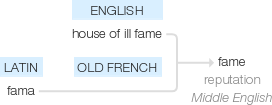Fame
Middle English (also in the sense ‘reputation’, which survives in house of ill fame): via Old French from Latin fama .
wiktionary
From Middle English fame, from Old French fame(“celebrity, renown”), itself borrowed from Latin fāma(“talk, rumor, report, reputation”), from Proto-Indo-European *bheh₂meh₂-, from *bʰeh₂-(“to speak, say, tell”). Cognate with Ancient Greek φήμη(phḗmē, “talk”). Related also to Latin for(“speak, say”, verb), Old English bōian(“to boast”), Old English bēn(“prayer, request”), Old English bannan(“to summon, command, proclaim”). More at ban.
Displaced native Old English hlīsa.
etymonline
fame (n.)
early 13c., "character attributed to someone;" late 13c., "celebrity, renown," from Old French fame "fame, reputation, renown, rumor" (12c.), from Latin fama "talk, rumor, report; reputation, public opinion; renown, good reputation," but also "ill-fame, scandal, reproach," from PIE root *bha- (2) "to speak, tell, say."
The goddess Fama was the personification of rumor in Roman mythology. The Latin derivative fabulare was the colloquial word for "speak, talk" since the time of Plautus, whence Spanish hablar.
I've always been afraid I was going to tap the world on the shoulder for 20 years, and when it finally turned around I was going to forget what I had to say. [Tom Waits, Playboy magazine interview, March, 1988]
